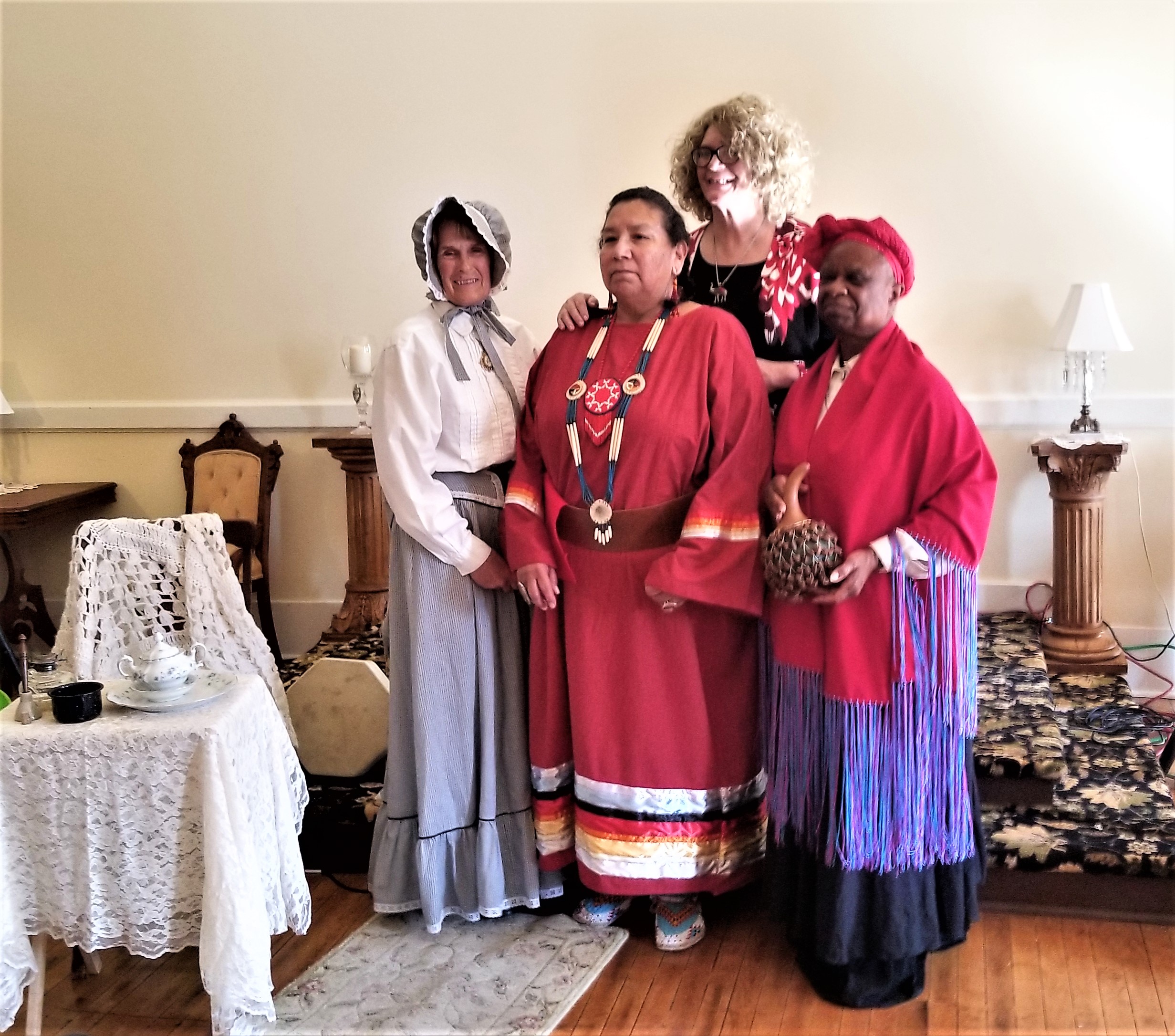Reconciliation and Wounded Knee

“Dakota Daughters” performance takes place at West River History Conference in effort to “spread the word on healing racism and building a shared inclusive future.” (Photo by Talli Nauman)
DEADWOOD – The theme of intercultural reconciliation took center stage here at the 37th gathering of the West River History Conference Oct. 12, as Gov. Kristi Noem proclaimed this date in 2019 as James Aplan Day.
The City of Deadwood Historic Preservation Department raised a flag to dedicate a pole in the late Great Plains historian’s name, and the audience watched the performance of “Dakota Daughters.”
The five-act stage play, subtitled “Wounded Knee … Three Lives, Three Women, Three Stories”, was enacted in the Olympic Ballroom of the 1898 Victorian-style Martin & Mason Hotel, where the conference was held.
The Wounded Knee Massacre took place just about 100 miles southeast of here in 1890, inspiring each of the four women who collaborate on the play to research and write her part in the historical interpretation of the events leading up to the tragedy for which the U.S. Congress eventually expressed “deep regret.”
In program notes, the collaborators explain, “Our goal is to help spread the word on healing racism and building a shared inclusive future.”
Oglala Lakota performer Geraldine Goes in Center from Wamblee plays the role of Sitting Bull’s daughter Kimemela, who travels with him to Canada and to Standing Rock in search of safety, before ending up at Wounded Knee on a visit to her Uncle Spotted Elk.
Meanwhile, Chadron State College teacher Lillian Witt portrays Sadie Babcock who moves with her husband and children from Texas to Lakota Territory to start up a cattle operation on “free land” held out by the federal government.
At the same time, Mattie Elmira, played by Black Hills State University graduate Joyce Jefferson, is reveling in newfound freedom from slavery and following her fiancé’s exploits as a post-Civil War Buffalo Soldier, which eventually leads her west to become Sadie’s live-in housekeeper.
The letters from her fiancé and the news in Sadie’s outdated periodicals spooks them with stories about the Battle of the Little Big Horn, the Black Hills gold rush, cattle rustling, the Ghost Dance, and finally the horror of the massacre in which Kimemela’s daughter is killed.
The episodes culminate in a song and prayer, “a blessing and image of reconciliation,” as the creators describe it.
Narrated by former Native Sun News Today contributor Kat Holmgren, “Dakota Daughters” raises awareness by illustrating the vastly divergent points from which Western History Conference goers have come together on what the playbill describes as “the timeless land.”
The production took place immediately following a simulated gunfight in the street outside the venue, provided by reenactors of a Wild West gambling brawl and shootout in “Deadwood Alive!” that the City of Deadwood offers the public during summer months and brushed up for conference goers on this occasion. The theme of this year’s conference was “The Way Out West.”
City of Deadwood Historic Preservation Officer Kevin Kuchenbecker earned the West River History Conference’s most coveted honor with the 2019 Herb Blakely Award presented by conference President Peg Aplan, widow of James, who garnered the award in 2018 during the tenure of former President Shebby Lee.
Conference goers boarded a trolley courtesy of the city for a ride to the Adams House Museum, where Kuchenbecker raised a U.S. flag to honor James. The Historical Preservation Department, with support from private donors, located a plaque at the base of the flagpole in commemoration of “James O. Aplan, Friend – Historian.”
West River History Conference Vice President Donovin Sprague thanked donors. A Minnicoujou Lakota from Cheyenne River Sioux Tribe, Sprague was quoted in a September issue of the New Yorker as an analyst of Crazy Horse Memorial history. He is a direct descendant of Crazy Horse’s uncle, Hump and a visiting professor of history at Sheridan College in Wyoming.
Among Native American history topics and presenters on the schedule were: “A Historical Geography of the State’s American Indian Reservations,” by Donald Berg; “Memories of an Extra in ‘Dances with Wolves’– 30 Years Later,” by Jeff Mammenga; “Crow Dog: End of Tribal Sovereignty,” by Wayne Gilbert; and “Unci Maka Tells Her Story,” by Jace Decory.
Due to winter weather and related challenging travel conditions, not all the expected presenters and guests arrived, however. James Aplan’s granddaughter Irene read Noem’s proclamation while his oldest son, her father, was stuck in snow at the Denver airport.
At a brunch provided by Black Hills Corral #8 of the International Westerners, a fellowship of history buffs, Director and Curator of the South Dakota State Railroad Museum Rick Mills delivered a keynote speech entitled “150 years of Railroading on the Northern Plains.”
Peg Aplan conveyed the awards for 2018 original research papers. They went to Ken Vogele for “Anti-German Sentiment in World War I South Dakota”; David Strain for “Growing Up in White River, South Dakota”; and Joselyn Vifquain for “He Was One of Them: World War I Soldier.”
The new Sago Conservation Merit Award, named after the conference’s late executive director, Roberta “Bobbi” Sago, went to Richard Carlson and Joanna Jones.
(Contact Talli Nauman at talli.nauman@gmail.com)
